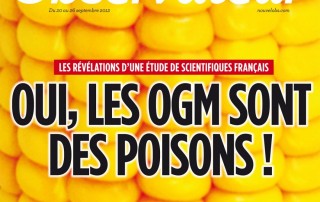Admittedly, I am biased. I founded CRIIGEN in 1999 because I needed to know. My government experience gave me serious doubts about GMOs. My scepticism was shared by the Prime Minister Alain Juppe, who had signed a moratorium on
Read More
Corinne Lepage MEP on why the Séralini study is “a bomb”: Huffington Post
Why Séralini’s methodology is statistically sound: Eminent statistician
The study on the harmful impact of GMOs, carried out on the initiative of Professor Séralini and his team, has raised stormy reactions: many critics have questioned the validity of the research methodology. Paul Deheuvels, member of the Academy
Read More
Dr Spiroux, co-author of the shocking study, responds to criticisms: Medscape Oncologie
The study that showed increased mortality in rats fed GM maize has sparked an outcry and reignited the debate on the approval of GMOs and pesticides. (more…)
How independent is the Science Media Centre and its experts? GMWatch
GMWatch, 24 September 2012
This is the first part of a response by GMWatch to the Science Media Centre’s “expert reaction” to Séralini’s study on GM maize.
On 19 September Prof Séralini’s team published a study that showed a commercialised Monsanto
Read More
Cancer specialist supports Séralini, condemns his critics
By Professor Dominique Belpomme (Professor Emeritus of Oncology at the University Paris-Descartes, ARTAC President, Executive Director ECERI – EUROPEAN CANCER AND ENVIRONMENT RESEARCH INSTITUTE)
I have been asked to give a scientific opinion on the recent paper by Gilles-Eric Séralini
Read More
Criticism: Séralini used too few animals to draw any conclusions
Summary answer:
Séralini used ten rats per sex per group – the same number of animals as Monsanto analyzed for blood and urine chemistry in its 90-day tests claiming to show that GM foods are safe. This is the same
Read More
Criticism: The statistical methods Séralini used are inadequate and his experiment has no statistical power
Summary answer:
According to standard carcinogenicity protocols, Séralini did not have enough animals to do a statistical analysis on the increased rates of tumours and mortality. He did have enough for a statistical analysis on the biochemical measurements, which confirmed
Read More
Criticism: Séralini used a type of rat naturally prone to tumours
Summary answer:
The Sprague-Dawley (SD) rat strain that Séralini used is also used in long-term 2-year toxicity and carcinogenicity studies by industry and academic scientists, as well as in 90-day studies on GMOs. If this was the wrong type of
Read More
Criticism: Tumour incidence and mortality rates were within “historical norms” and should be dismissed
Summary answer:
Many of Séralini’s critics say that the tumour incidence and mortality rates fall within the range of “historical norms” and so can be dismissed. The critics are referring to historical control data – data from other experiments and
Read More
Why this study now?
Séralini designed his 2012 study as a direct followup of a previous study on the same NK603 maize conducted by Monsanto to support its application for regulatory authorization.
Monsanto’s study was a 90-day rat feeding trial on NK603. Monsanto published
Read More




















